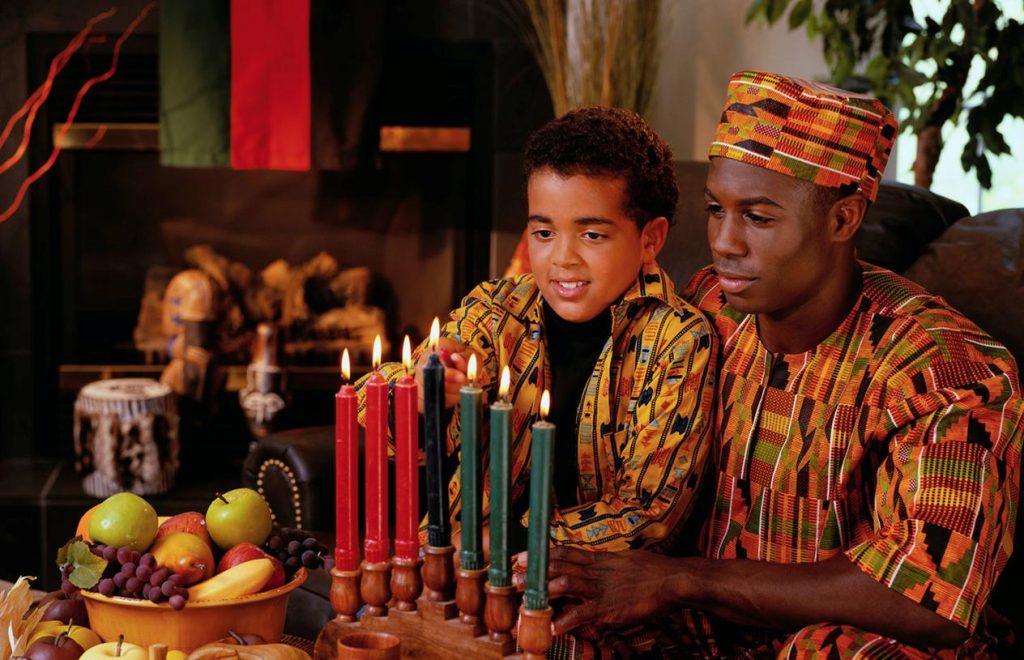
PHOTO: theblackmancan.org
Kwanzaa is the newest addition to the winter holidays. It was created fifty years ago, and since it’s so new, it’s often misunderstood by many people. During the 1960s, a college professor named Maulana Karenga created Kwanzaa as a celebration of African culture, modeled after several different traditional African harvest holidays. The first ever Kwanzaa celebration occurred in 1966, and the holiday is slowly gaining popularity across the United States.
1. Kwanzaa Is Not Necessarily An Alternative to Christmas.
Maulana Karenga wrote “Kwanzaa is not a religious holiday, but a cultural one with an inherent spiritual quality. Thus, Africans of all faiths can and do celebrate Kwanzaa, i.e. Muslims, Christians, Black Hebrews, Jews, Buddhists, Baha’i, ad Hindus, as well as those who follow the ancient traditions of Maat, Yoruba, Ashanta, Dogon, etc.”
Kwanzaa is not meant to be an alternative to Christmas. Karenga created it after the famous Watts riots shook the United States in an attempt to unite and empower the African-American community. Kwanzaa is meant to be a celebration of African-American culture, not a replacement for Christmas. Many people celebrate both Christmas and Kwanzaa.
2. Kwanzaa Was Created to Teach Seven Principles
When Karenga created Kwanzaa to help unify and empower the African-American community, he chose seven cultural principles taken from different African cultures. Kwanzaa is all about Umoja (unity), Kujichagulia (self-determination), Ujima (community work and responsibility), Ujamaa (shared economics), Nia (ultimate purpose), Kuumba (creativity), and Imani (faith).
3. Homemade Gifts Are Preferred Over Storebought Ones.
Those who celebrate Kwanzaa are trying to keep the holiday from being as commercialized as Christmas, Halloween, and Easter, so instead of participating in the crazy rush to buy holiday gifts from shopping malls, handmade gifts are encouraged. If the participant isn’t particularly crafty, however, they’ll often buy music, art supplies, books, or cultural products from an African-American-owned business. The gifts often represent unity, creativity, and kindness, and they’re given not only to family members, but also to guests and friends to welcome them as part of the group and promote community unity.
4. Kwanzaa Lasts Seven Days.
Similar to Hanukkah, Kwanzaa lasts seven days, and has a candle-lighting ceremony where one candle is lit every day of Kwanzaa. Once the candle has been lit by a child, one principle is discussed for that day.
On the first day, “Umoja”, or Unity is discussed, this chiefly deals with unity in the human race as a whole, in the nation, in the local community, and finally in the family.
On the second day, self-determination, or “Kujichagulia”, the ability to speak for oneself and others, is discussed.
On the third day, “Ujima” is discussed. Ujima promotes building a community and helping out one’s neighbor.
On the fourth day, “Ujamaa”, what is best defined as ‘cooperative economics’ is discussed. The idea is to create stores and business that work together, rather than compete against each other.
On the fifth day, “Nia”, or purpose, is discussed. This refers to the purpose of, as Karenga wrote, “to make our collective vocation the building and developing of our community in order to restore our people to their traditional greatness”.
On the sixth day, “Kuumba”, or creativity, is discussed. Creativity in Kwanzaa is about beautifying the community and making it a better place for future generations.
On the seventh day, “Imani”, or faith is discussed. This is not religious faith, but faith in each other and faith that, eventually, the struggle of the African-American community will end. Traditionally, on the seventh day, meaningful gifts are given to each other that encourage growth and success, to award accomplishments and celebrate creativity.
5. Anyone Can Celebrate!
According to Kwanzaa’s founder, anyone can celebrate Kwanzaa. You don’t have to be African-American to observe the holiday, you just have to have a respect for the culture and the ideals that Kwanzaa represents. Just like non-Mexicans can celebrate Dia de Los Muertos and Cinco de Mayo, and non-Native Americans often participate in powwows, non African-Americans can observe Kwanzaa if they want to.

